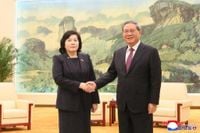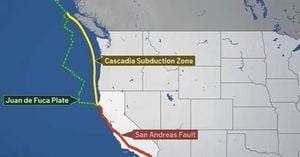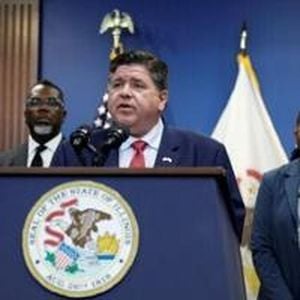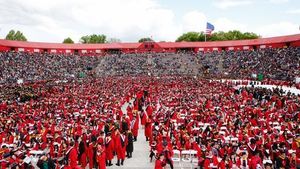China’s Premier Li Qiang is set to visit North Korea this week, marking the highest-level Chinese delegation to the reclusive nation since 2019. The trip, which will run from Thursday, October 9, through Saturday, October 11, 2025, coincides with the 80th anniversary of the founding of North Korea’s ruling Workers’ Party—a milestone that Pyongyang is preparing to celebrate in dramatic fashion.
The Chinese Foreign Ministry announced Tuesday that Li will lead both a party and government delegation to attend the anniversary celebrations and pay an official goodwill visit. According to the Associated Press, the ministry described the two countries as “traditional friends and neighbors” and emphasized that “maintaining, consolidating and developing China-North Korea relations has always been the unwavering strategic policy of the Chinese Communist Party and government.”
This visit is significant not only because Li Qiang is one of seven members of the powerful Politburo Standing Committee and considered the No. 2 leader in China after President Xi Jinping, but also because it comes at a time of shifting alliances and delicate diplomacy on the Korean Peninsula. Xi himself last visited North Korea in 2019, before the onset of the COVID-19 pandemic, and has since reduced his foreign travel schedule, leaving Li to represent China on more international trips.
North Korea’s 80th anniversary events are drawing a bevy of high-profile guests from across Asia and beyond. Russia is sending former President Dmitri Medvedev to the celebrations, as confirmed by North Korea’s state-run Korean Central News Agency (KCNA) and reported by UPI. Vietnam’s top leader, To Lam, general secretary of the Communist Party, will also make his first visit to North Korea since 2007, according to Vietnam’s state media. The president of Laos, Thongloun Sisoulith, himself the general secretary of the Lao People’s Revolutionary Party, is expected to attend as well.
According to Seoul-based SI Analytics, North Korea is preparing for what is likely to be its largest-ever military parade to mark the anniversary. Satellite imagery analysis suggests at least 14,000 personnel will take part, with new weapons—including the Hwasong-20 intercontinental ballistic missile—likely to be unveiled. The parade is expected to be a display of strength, underscoring both North Korea’s military ambitions and its desire to showcase the support of its closest allies.
The flurry of diplomatic activity comes after years of speculation about a potential rift between Beijing and Pyongyang. North Korean leader Kim Jong Un has been notably working to balance his country’s relationships with both China and Russia. In a move that raised eyebrows in capitals worldwide, Kim sent North Korean troops to assist Russia in its ongoing war against Ukraine. This deepening military alignment with Moscow had prompted some analysts to wonder whether Pyongyang was drifting away from its historic reliance on Beijing.
However, recent developments suggest a warming of ties between China and North Korea. Last month, Kim Jong Un traveled to Beijing to attend a military parade commemorating the 80th anniversary of the end of World War II, where he met with Xi Jinping—his first summit with the Chinese president in six years. Just last week, North Korean Foreign Minister Choe Son Hui visited Beijing, holding talks with both Li Qiang and his Chinese counterpart Wang Yi, in what both sides described as a reaffirmation of their enduring partnership.
“China and North Korea are traditionally friendly neighbors,” a spokesperson for China’s Foreign Ministry reiterated, as quoted by UPI. The ministry’s official statement also called the relationship an “unswerving strategic policy” of both the Chinese government and the ruling Communist Party “to maintain, consolidate and develop” ties with North Korea.
Vietnam’s To Lam, who holds the same general secretary title as Xi Jinping in China and Kim Jong Un in North Korea, is making his first trip to Pyongyang in nearly two decades. According to Vietnam’s state media, this visit marks a significant moment in the two countries’ relations, which have been relatively quiet since 2007. The presence of Thongloun Sisoulith, president of Laos and leader of the Lao People’s Revolutionary Party, further highlights the event’s regional significance.
High-level contacts between China and North Korea have been on the rise since 2024. Zhao Leji, another member of China’s Politburo Standing Committee, traveled to Pyongyang in April 2024 and met with Kim Jong Un, signaling renewed diplomatic engagement. Kim’s own visit to China last month, where he joined Russian President Vladimir Putin at the military parade in Beijing, underlines the complex web of relationships now shaping Northeast Asian geopolitics.
While the focus is on the anniversary and diplomatic pageantry, the backdrop is one of strategic calculation. North Korea’s decision to send troops to aid Russia in Ukraine signals a willingness to diversify its international partnerships, even as it seeks to maintain the lifeline of Chinese economic and political support. For Beijing, the relationship with Pyongyang remains a delicate balancing act: China is North Korea’s main trading partner and source of aid, but it is also wary of being drawn too deeply into Pyongyang’s confrontations with the West.
As for the spectacle itself, the planned military parade is expected to be a highlight of the celebrations. Analysts believe that by unveiling new weapons systems and mobilizing tens of thousands of troops, North Korea hopes to send a message of strength to both its own citizens and the wider world. At the same time, the presence of top officials from China, Russia, Vietnam, and Laos will be a powerful reminder of the enduring—if sometimes complicated—ties that bind these communist and formerly communist states together.
Independent journalists have not been granted access to the events, and images distributed by North Korean state media, such as the one showing Premier Li meeting Foreign Minister Choe Son Hui at the Great Hall of the People in Beijing, cannot be independently verified. Still, the symbolism of Li Qiang’s visit is unmistakable. As China’s No. 2 leader, his presence in Pyongyang underscores Beijing’s commitment to maintaining its influence on the Korean Peninsula, even as regional dynamics shift and new alliances are tested.
With the world watching, North Korea’s anniversary celebrations are shaping up to be both a show of unity among old allies and a stage for Pyongyang to assert its place on the global stage. Whether this flurry of diplomacy leads to lasting changes in the region’s balance of power remains to be seen, but for now, the message from Beijing and Pyongyang is one of solidarity and shared purpose.




